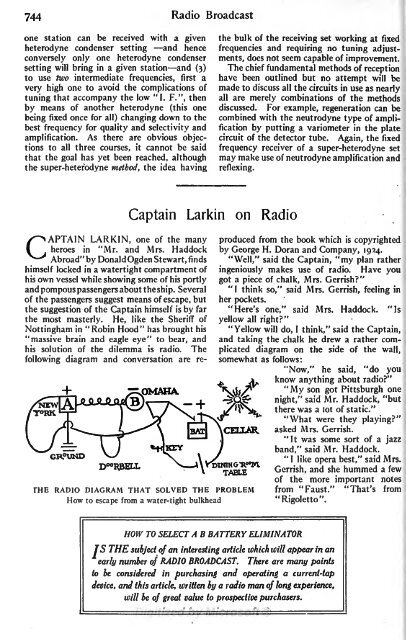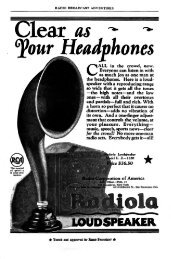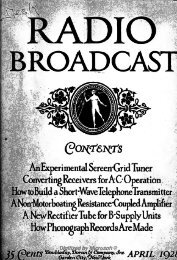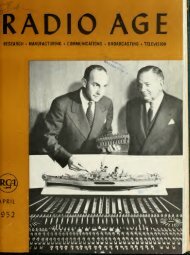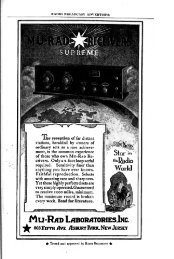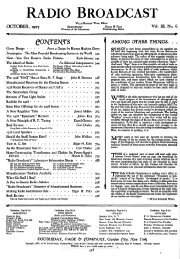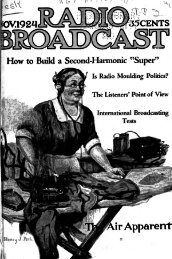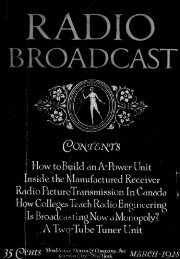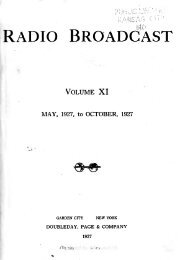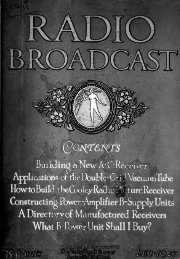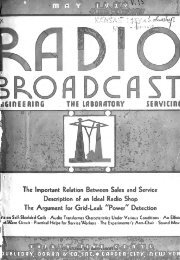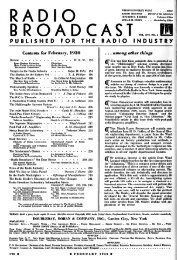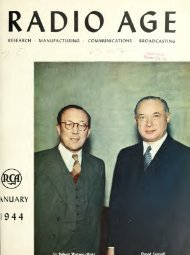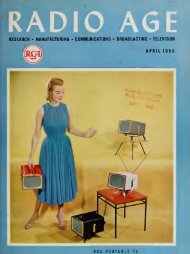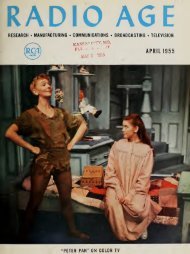Radio Broadcast - 1925, February - 113 Pages ... - VacuumTubeEra
Radio Broadcast - 1925, February - 113 Pages ... - VacuumTubeEra
Radio Broadcast - 1925, February - 113 Pages ... - VacuumTubeEra
Create successful ePaper yourself
Turn your PDF publications into a flip-book with our unique Google optimized e-Paper software.
744 <strong>Radio</strong> <strong>Broadcast</strong><br />
one station can be received with a given<br />
heterodyne condenser setting and hence<br />
conversely only one heterodyne condenser<br />
setting will bring in a given station and (3)<br />
to use two intermediate frequencies, first a<br />
very high one to avoid the complications of<br />
tuning that accompany the low "I. F.", then<br />
by means of another heterodyne (this one<br />
being fixed once for all) changing down to the<br />
best frequency for quality and selectivity and<br />
amplification. As there are obvious objections<br />
to all three courses, it cannot be said<br />
that the goal has yet been reached, although<br />
the super-heterodyne method, the idea having<br />
the bulk of the receiving set working at fixed<br />
frequencies and requiring no tuning adjustments,<br />
does not seem capable of improvement.<br />
The chief fundamental methods of reception<br />
have been outlined but no attempt will be<br />
made to discuss all the circuits in use as nearly<br />
all are merely combinations of the methods<br />
discussed. For example, regeneration can be<br />
combined with the neutrodyne type of amplification<br />
by putting a variometer in the plate<br />
circuit of the detector tube. Again, the fixed<br />
frequency receiver of a super-heterodyne set<br />
may make use of neutrodyne amplification and<br />
reflexing.<br />
Captain<br />
Larkin on <strong>Radio</strong><br />
LARKIN, one of the many<br />
heroes in "Mr. and Mrs. Haddock<br />
CAPTAIN<br />
Abroad" by Donald Ogden Stewart, finds<br />
himself locked in a watertight compartment of<br />
his own vessel while showing some of his portly<br />
and pompous passengers about the ship. Several<br />
of the passengers suggest means of escape, but<br />
the suggestion of the Captain himself is by far<br />
the most masterly. He, like the Sheriff of<br />
Nottingham in "Robin Hood" has brought his<br />
"massive brain and eagle eye" to bear, and<br />
his solution of the dilemma is radio. The<br />
following diagram and conversation are re-<br />
THE RADIO DIAGRAM THAT SOLVED THE PROBLEM<br />
How to escape from a water-tight bulkhead<br />
produced from the book which is<br />
copyrighted<br />
by George H. Doran and Company, 1974.<br />
"Well," said the Captain, "my plan rather<br />
ingeniously makes use of radio. Have you<br />
Mrs. Gerrish"<br />
got a piece of chalk,<br />
"I think so," said Mrs. Gerrish, feeling in<br />
her pockets.<br />
"Here's one," said Mrs. Haddock. "Is<br />
yellow all right"<br />
"Yellow will do, I think," said the Captain,<br />
and taking the chalk he drew a rather complicated<br />
diagram on the side of the wall,<br />
somewhat as follows:<br />
"Now," he said, "do you<br />
know anything about radio"<br />
"My son got Pittsburgh one<br />
night," said Mr. Haddock, "but<br />
there was a lot of static."<br />
"What were they playing"<br />
DINING -R 00 !*!<br />
TABLE<br />
asked Mrs. Gerrish.<br />
"It was some sort of a jazz<br />
band," said Mr. Haddock.<br />
"I like opera best," said Mrs.<br />
Gerrish, and she hummed a few<br />
of the more important notes<br />
from "Faust." "That's from<br />
"Rigoletto".<br />
HOW TO SELECT A B BATTERY ELIMINATOR<br />
7S THE subject of an interesting article which will appear in an<br />
early number of RADIO BROADCAST. There are many points<br />
to be considered in purchasing<br />
and operating a current-tap<br />
device, and this article, written by a radio man of long experience,<br />
will be of great value to prospective purchasers.


